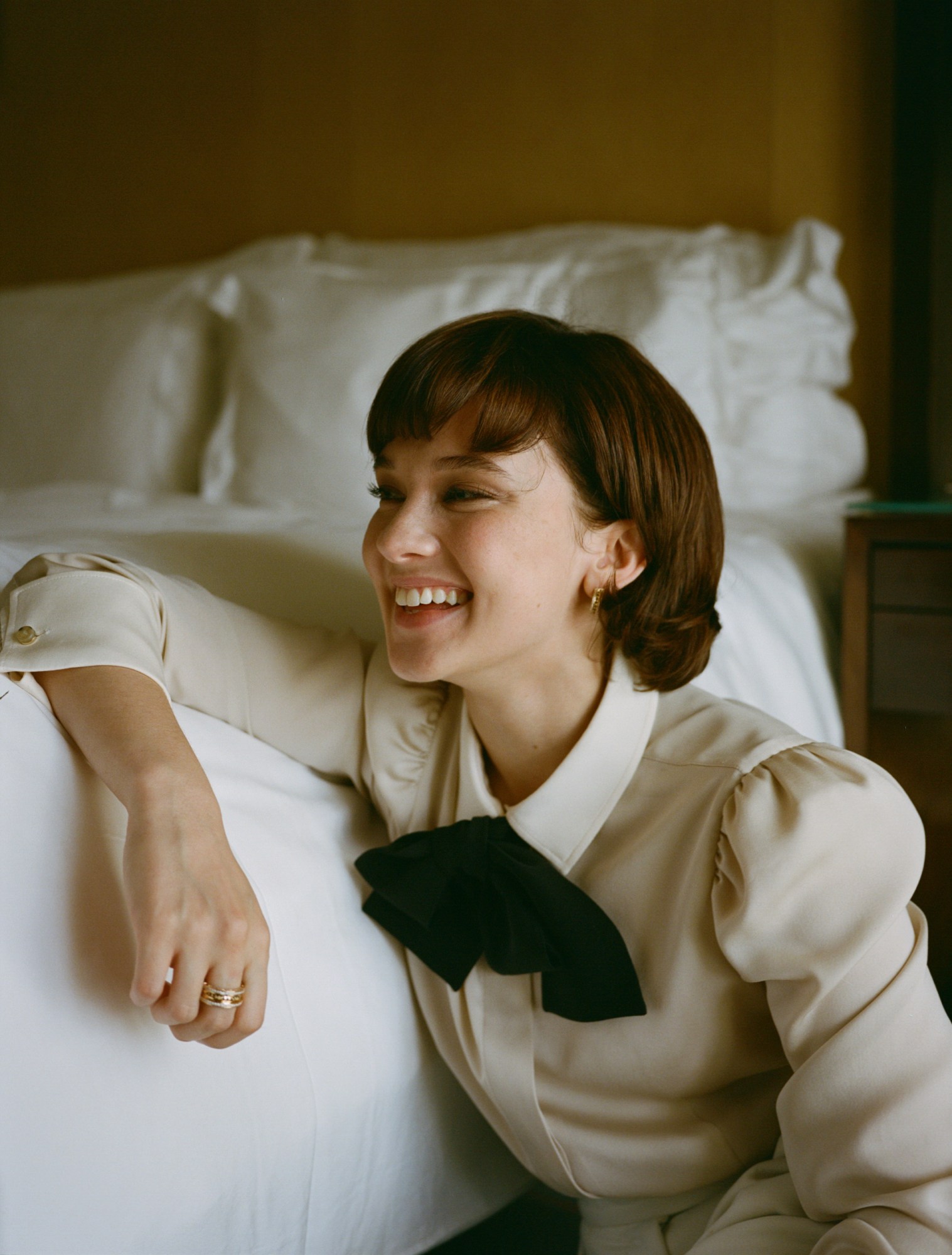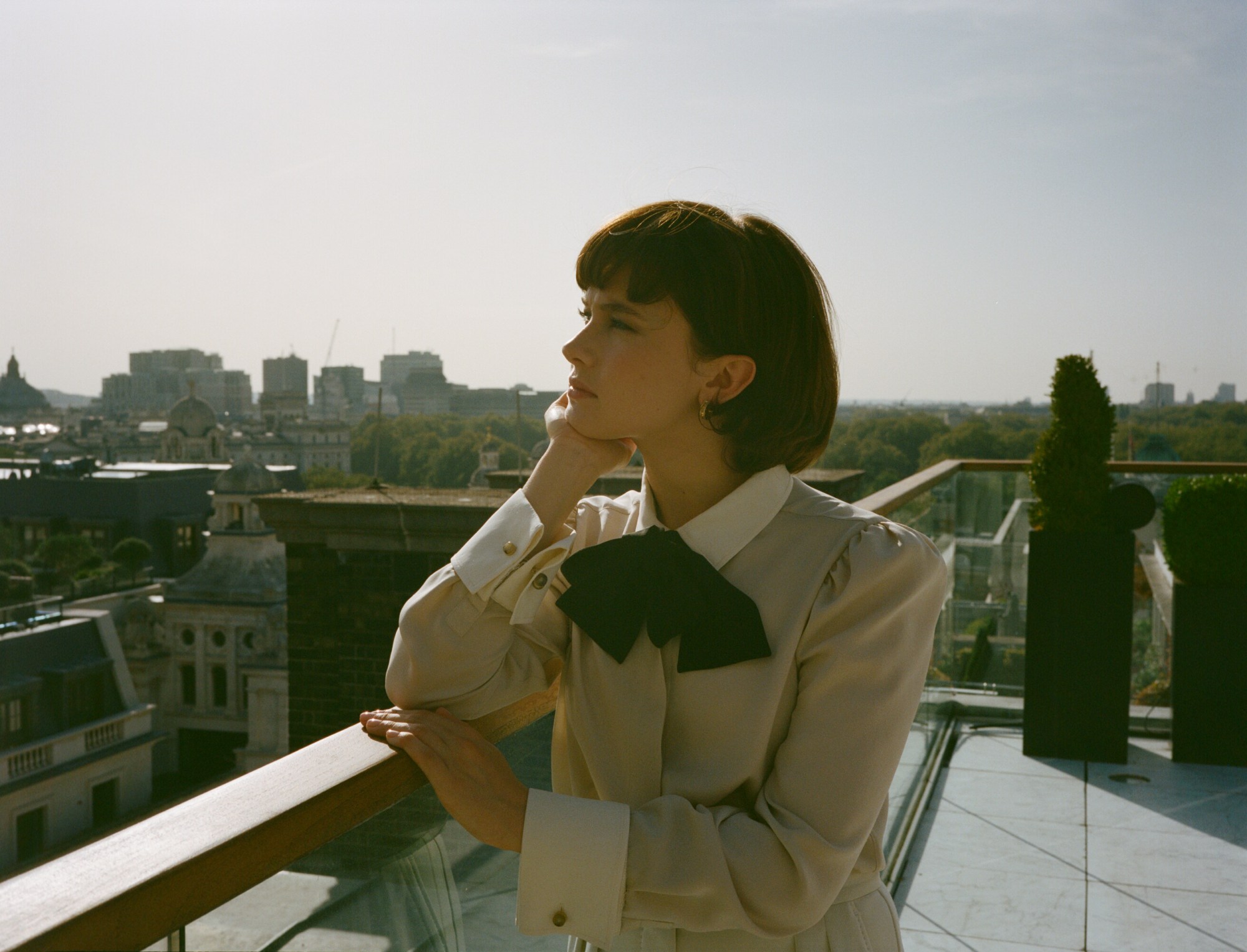Cailee Spaeny hasn’t seen a list of past winners of the Volpi Cup, the Venice Film Festival’s prestigious Best Actress prize that she won for her portrayal of Priscilla Presley. She laughs when I ask if she wants to know the names of the others (among them: Sophia Loren, Cate Blanchett, Tilda Swinton, Emma Stone). “If you want to tell me,” she says politely, pouring me a glass of water. “I’ve heard some [of them]. I try not to look at those things… Good attention can be just as damaging as bad attention.”
It’s a perspective that’s very telling of Cailee Spaeny, the actor. She has been working for well over a decade now, with roles small and large in films such as On the Basis of Sex, Vice and Pacific Rim Uprising – films which had louder selling points (Ruth Bader Ginsberg; director Adam McKay; John Boyega) that overshadowed her integral involvement. But with her lead role in Sofia Coppola’s pristine and lovelorn Priscilla, the 25-year-old Missouri native is navigating an entirely new level of stardom and an industry that is raring to take and take from stars like her – the Faustian pact of it all. But she is determined, with a fierceness that belies her gentle demeanour, to keep her feet planted firmly on the ground.
That isn’t to say that Cailee isn’t delighted by her whirlwind adventure as the queen of rock ‘n’ roll – she is, she tells me, “so lucky” to have experienced the film’s reception both at Venice and elsewhere. (After we speak, she’ll earn a Best Actress – Drama nomination at the Golden Globes.) But for Cailee, Priscilla holds an unshakeable place in her heart not for what it has become, but for what it always was: an opportunity to pour herself into a character, to excavate the untold side of a young girl’s story, to work with one of her most admired directors. “It’s literally everything I could have ever wanted wrapped up in one, with a beautiful bow on top,” she says, breaking momentarily into a breathless gush. “Sofia is my dream director. Her films changed me when I was 14 years old.”
As a director, Sofia – who speaks so universally to women’s most intimate worlds – makes this mark on so many people. “She gave permission for me and for young women to be complex; to have a dark side and needs and yearnings,” Cailee says. “To be sexual or angry…she just sees them how they are. Especially growing up in the Bible Belt of America, there’s definitely a certain way you feel you need to be.” The first of Sofia’s films that entered her world was The Virgin Suicides, a film that grapples with the impossibility of burgeoning sexuality amidst suffocating religious strictures. “When I watched her films, even though it stayed internal and private, I felt that side of myself could be explored,” Cailee says. “I didn’t have to be afraid of [it] anymore.”

Priscilla is, in this regard, an archetypal Sofia Coppola endeavour, ripe with the impossible contradictions of girlhood: the simultaneous accretion and deprivation of agency, the consuming drive and vulnerability of first desire, the elision between one’s private world and the public sphere. It is also the first cinematic portrayal of Elvis Presley (played in the film by Jacob Elordi) and Priscilla’s relationship to pay wary, steady attention to the troubling age gap between the two – they began courting when Priscilla was 14 and Elvis was 27 – laying bare not only its embedded violence, but the complex language of sexual awakening that articulated it. “It is such a grey area,” Cailee says. “It’s shocking and uncomfortable, but at the same time, [Priscilla] is initiating a lot of the sexual moments.” She met the real Priscilla before filming. “The thing [she] said to me is that there was real love there. She would still consider him to be the love of her life. And that’s complicated, but very human. I just wanted to take her truth and put it on screen, and let people decide how they felt after.”
Navigating the complication of the age gap was just one of many conversations that the real-life Priscilla and Cailee had in the months the latter spent researching the role, and Priscilla’s thoughts on the film remain one of the few external markers of success to which Cailee pays attention. Yet there was a tension, Cailee explains, that she felt within her own acting process; in wanting to both remain true to Priscilla’s story while retaining the creative autonomy that comes with creating a role. “I really struggled with it,” she says. “I spent a lot of time talking to her but when I started filming, I stopped having contact. We only had 30 days to shoot, and I think if I was going into each scene thinking, ‘Oh, she was having this thought’, it would have [become] too controlled. Sometimes Jacob and I would feel lost, and we’d have to remind ourselves that we’re doing a marriage story in a Sofia Coppola film, just to come back to the actual core of the scene.”
30 days is, in the grand scheme of things, a short shoot, but it is a long time to inhabit another person’s quiet longings and heart-dropping fears; their entire, tangled coming of age. Over 30 days, and over the 110 minutes of the film, Cailee blooms into and out of Priscilla – the eyeliner-slicked, backcombed, frail slip of a girl who comes to learn the heavy price of fame and glamour, the shadowed underworld of everything that had once drawn her in. Inhabiting her so entirely might have taught Cailee much the same thing, if she didn’t already feel it immutably: she has, she tells me, always been wary of the insatiable, vampiric nature of fame, something that no amount of lead roles or prizes can shake.
“I’m pretty cynical about this industry, and I feel very protective of actors and their lives,” she says, guarded and firm. “I don’t think they get treated fairly – this industry can be completely exploitative. [Playing Priscilla] just amplified it, the more I looked at their lives and things that affected them. A lot of the pain came from his fame – he didn’t know how to wrap his head around [it].”
I tell her how surprised I was by the cult of personality that still surrounds Elvis and she agrees (although, as a Southerner who visited Graceland multiple times as a child, it perhaps came as less of a shock). “It is bananas!” she says, echoing my words back to me. “There’s a real sort of subculture. I find it all very odd when people are that fascinated by people’s lives that they don’t know. Which is also why this story needs to be told, I think. Because in all the countless versions of his story that we’ve received, we’ve [never] really been in this interior world with her.”
It’s a difficult line to tread for any young actress – navigating the fine line between the demands of fame as a monster and the possibilities of fame as opportunity. Yet Cailee is confident – and determined – to get it right. “I don’t feel like my personal life is getting mixed in,” she says of her skyrocketing success as Priscilla. “I feel I’m keeping that separate – the attention feels like it’s coming from my work. It’s coming from this movie and my performance and whether people like it or not, from the research I do and the acting that I put on screen, and that’s completely fine.” She shrugs, and smiles. “I’m an artist and I put my art out and I have people judge it.” If Priscilla’s own story was once seen as a fairy tale, Cailee’s is the subversive retelling: the star of the year’s gauziest and gaudiest film, working in the world’s gauziest and gaudiest industry, refusing its gilded cage.
‘Priscilla’ is out now in the US via A24 and in UK cinemas from 1 January 2024 via MUBI, with previews from 26 December

Credits
Photography Sophie Davidson



